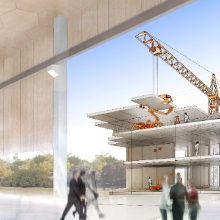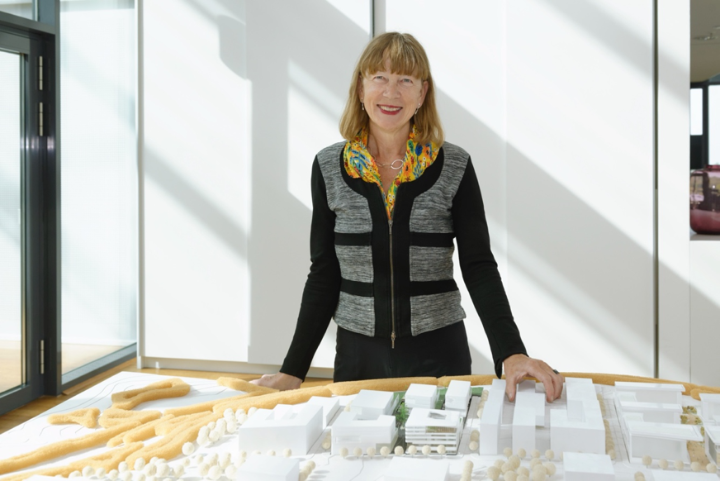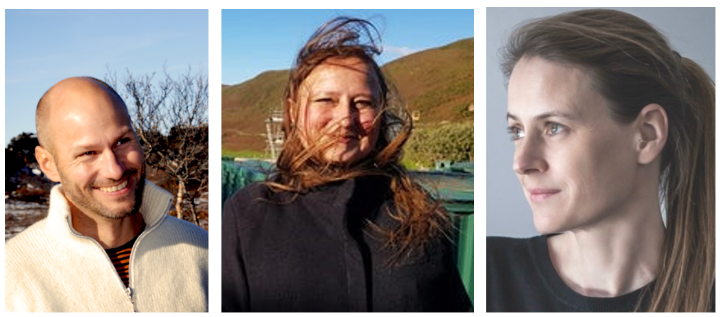Lectures
Knowledge is becoming increasingly important as a "new raw material" for working and living in cities. Universities and research institutions are becoming magnets for talent, while at the same time promoting creativity and innovation. They play a crucial role as a location factor and can act as an engine for urban development. Many cities are using this insight when drawing up strategic concepts to strengthen the contribution of universities to the city's identity. The challenges this implies spatially will be demonstrated using various examples (RWTH Aachen, University of Kassel, ETH Zurich, etc.).
15.4.2021 | 17:30 Uhr
Diskussion: Prof. Achim Menges (IntCDC) & Prof. Markus Allmann (IRGE, Uni Stuttgart)
Moderation: apl. Prof. Dr. Kathrin Braun (IntCDC)
Vorträge:
Das kollaborative Habitat
Séverine Marguin (TU Berlin) & Henrike Rabe (BIM)
Wie kann Wissenschaftsarchitektur neue Kollaborationskulturen erschließen? Marguin und Rabe haben diese Frage anhand eines interdisziplinären, gestaltungsbasierten und ‚kollaborativen‘ Langzeitexperiments am Exzellenzcluster Bild Wissen Gestaltung (HU Berlin) erkundet und geben Einblicke in die Charakteristiken eines sogenannten kollaborativen Habitats des Forschens.
Dr. Séverine Marguin ist Soziologin und Leiterin des Methodenlabs des SFB 1265 „Re-Figuration von Räumen“ an der TU Berlin.
Henrike Rabe ist Architektin und betreut als Baumana- gerin bei der BIM GmbH die Planung von Kulturbauten für die Stadt Berlin.
Neue Beweglichkeit im Denken
Georg Vrachliotis (TU Delft)
„Der moderne Mensch will und muss von der Technik Gebrauch machen, um unabhängig und im losen Rahmen einer Gesellschaftsordnung höchst beweglich zu wer- den“, forderte Yona Friedman auf der Suche nach einem entwerferischen Gleichgewicht von Technologie und Gesellschaft. Wie lässt sich die Idee der „Beweglichkeit“ für das Bauprojekt des Exzellenzclusters neu interpretieren und denken — räumlich, methodisch, intellektuell, gesellschaftlich?
Prof. Dr. Georg Vrachliotis ist Professor für Theory of Architecture and Digital Culture an der TU Delft.
6.5.2021 | 17:00 Uhr
University Buildings and Experimental Environments Accounting for Future Matters of Concern and More-than-Human Needs (Panel Discussion)
Moderation: Dr. Yana Boeva (IntCDC)
University buildings provide a testing ground for proposals to current matters of concern. At the same time, novel environments need to consider future more-than-human demands in their design and use. The lecture explores these challenges with research examples from designer-user relations in sociotechnical change and university buildings’ architectural history.
Dr. Marie Davidová is an architect, lecturer at the Welsh School of Architecture and affiliate of the Sustainable Places Research Institute at Cardiff University
Prof. Dr. Sampsa Hyysalo is professor of Co-Design at the Aalto University School of Art, Design and Architecture in Helsinki.
Prof. Dr. Silke Langenberg is an architect and professor of Construction Heritage and Preservation at ETH Zürich.
24.6.2021 | 17:00 Uhr





